Related Research Articles
Individualist anarchism is the branch of anarchism that emphasizes the individual and their will over external determinants such as groups, society, traditions, and ideological systems. Although usually contrasted with social anarchism, both individualist and social anarchism have influenced each other. Some anarcho-capitalists claim anarcho-capitalism is part of the individualist anarchist tradition, while others disagree and claim individualist anarchism is only part of the socialist movement and part of the libertarian socialist tradition. Economically, while European individualist anarchists are pluralists who advocate anarchism without adjectives and synthesis anarchism, ranging from anarcho-communist to mutualist economic types, most American individualist anarchists of the 19th century advocated mutualism, a libertarian socialist form of market socialism, or a free-market socialist form of classical economics. Individualist anarchists are opposed to property that violates the entitlement theory of justice, that is, gives privilege due to unjust acquisition or exchange, and thus is exploitative, seeking to "destroy the tyranny of capital,—that is, of property" by mutual credit.

Victoria Claflin Woodhull, later Victoria Woodhull Martin, was an American leader of the women's suffrage movement who ran for president of the United States in the 1872 election. While many historians and authors agree that Woodhull was the first woman to run for the presidency, some disagree with classifying it as a true candidacy because she was younger than the constitutionally mandated age of 35.
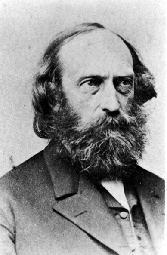
Stephen Pearl Andrews was an American libertarian socialist, individualist anarchist, linguist, political philosopher, and outspoken abolitionist.
Christian anarchism is a Christian movement in political theology that claims anarchism is inherent in Christianity and the Gospels. It is grounded in the belief that there is only one source of authority to which Christians are ultimately answerable—the authority of God as embodied in the teachings of Jesus. It therefore rejects the idea that human governments have ultimate authority over human societies. Christian anarchists denounce the state, believing it is violent, deceitful and idolatrous.
Self-ownership, also known as sovereignty of the individual or individual sovereignty, is the concept of property in one's own person, expressed as the moral or natural right of a person to have bodily integrity and be the exclusive controller of one's own body and life. Self-ownership is a central idea in several political philosophies that emphasize individualism, such as libertarianism, liberalism, and anarchism.
Mutualism is an anarchist school of thought and anti-capitalist market socialist economic theory that advocates for workers' control of the means of production, a market economy made up of individual artisans and workers' cooperatives, and occupation and use property rights. As proponents of the labour theory of value and labour theory of property, mutualists oppose all forms of economic rent, profit and non-nominal interest, which they see as relying on the exploitation of labour. Mutualists seek to construct an economy without capital accumulation or concentration of land ownership. They also encourage the establishment of workers' self-management, which they propose could be supported through the issuance of mutual credit by mutual banks, with the aim of creating a federal society.

Josiah Warren was an American utopian socialist, American individualist anarchist, individualist philosopher, polymath, social reformer, inventor, musician, printer and author. He is regarded by anarchist historians like James J. Martin and Peter Marshall among others as the first American anarchist and the four-page weekly paper he edited during 1833, The Peaceful Revolutionist, the first anarchist periodical published, was an enterprise for which he built his own printing press, cast his own type, and made his own printing plates.
Anarchism in the United States began in the mid-19th century and started to grow in influence as it entered the American labor movements, growing an anarcho-communist current as well as gaining notoriety for violent propaganda of the deed and campaigning for diverse social reforms in the early 20th century. By around the start of the 20th century, the heyday of individualist anarchism had passed and anarcho-communism and other social anarchist currents emerged as the dominant anarchist tendency.
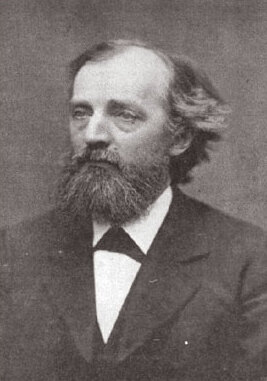
Ezra Hervey Heywood, known as Ezra Hervey Hoar before 1848, was an American individualist anarchist, slavery abolitionist, and advocate of equal rights for women.
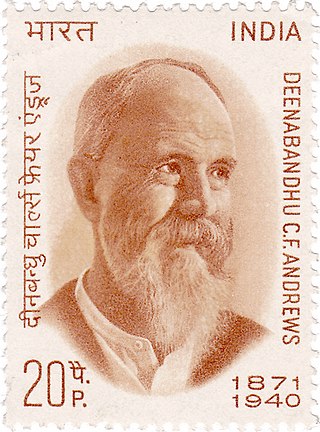
Charles Freer Andrews was an Anglican priest and Christian missionary, educator and social reformer, and an activist for Indian independence. He became a close friend of Rabindranath Tagore and Mahatma Gandhi and identified with the Indian liberation struggle. He was instrumental in convincing Gandhi to return to India from South Africa, where Gandhi had been a leading light in the Indian civil rights struggle.
Individualist anarchism in the United States was strongly influenced by Benjamin Tucker, Josiah Warren, Ralph Waldo Emerson, Lysander Spooner, Pierre-Joseph Proudhon, Max Stirner, Herbert Spencer and Henry David Thoreau. Other important individualist anarchists in the United States were Stephen Pearl Andrews, William Batchelder Greene, Ezra Heywood, M. E. Lazarus, John Beverley Robinson, James L. Walker, Joseph Labadie, Steven Byington and Laurance Labadie.

Lady Tennessee Celeste Claflin, Viscountess of Montserrat, also known as Tennie C., was an American suffragist best known as the first woman, along with her sister Victoria Woodhull, to open a Wall Street brokerage firm, which occurred in 1870.
Anarchism in India first emerged within the Indian independence movement, gaining particularly notoriety for its influence on Mohandas Gandhi's theory of Sarvodaya and his practice of nonviolent resistance. Anarchism was also an influence on the revolutionary movement, inspiring the works of Har Dayal, M. P. T. Acharya and Bhagat Singh, among others.

Pioneers of American Freedom: Origin of Liberal and Radical Thought in America is a book by Rudolf Rocker, a German anarcho-syndicalist, about the history of liberal, libertarian, and anarchist thought in the United States.
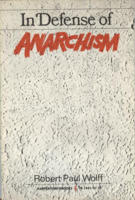
In Defense of Anarchism is a 1970 book by the philosopher Robert Paul Wolff, in which the author defends philosophical anarchism. He argues that individual autonomy and state authority are mutually exclusive and that, as individual autonomy is inalienable, the moral legitimacy of the state collapses.
Egoist anarchism or anarcho-egoism, often shortened as simply egoism, is a school of anarchist thought that originated in the philosophy of Max Stirner, a 19th-century philosopher whose "name appears with familiar regularity in historically orientated surveys of anarchist thought as one of the earliest and best known exponents of individualist anarchism". Egoist anarchism places the individual at the forefront, crafting ethical standards and actions based on this premise. It advocates personal liberation and rejects subordination, emphasizing the absolute priority of self-interest.
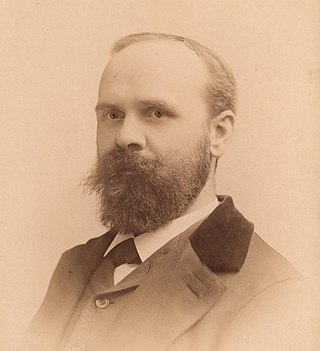
Benjamin Ricketson Tucker was an American individualist anarchist and self-identified socialist. Tucker was the editor and publisher of the American individualist anarchist periodical Liberty (1881–1908). Tucker described his form of anarchism as "consistent Manchesterism" and "unterrified Jeffersonianism".
A general strike is a strike action in which participants cease all economic activity, such as working, to strengthen the bargaining position of a trade union or achieve a common social or political goal. They are organised by large coalitions of political, social, and labour organizations and may also include rallies, marches, boycotts, civil disobedience, non-payment of taxes, and other forms of direct or indirect action. Additionally, general strikes might exclude care workers, such as teachers, doctors, and nurses.

The International Workingmen's Association (IWA) in the United States of America took the form of a loose network of about 35 frequently discordant local "sections," each professing allegiance to the London-based IWA, commonly known as the "First International." These sections were divided geographically and by the language spoken by their members, frequently new immigrants to America, including those who spoke German, French, Czech, as well as Irish and "American" English-language groups.

Woodhull & Claflin's Weekly was an American weekly newspaper first published on May 14, 1870, by sisters Victoria Woodhull and Tennessee Claflin. It was among the first publications to be published by women. It lasted until June 10, 1876.